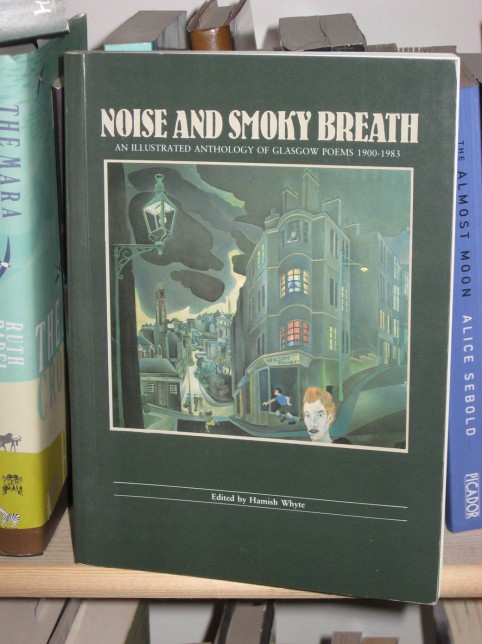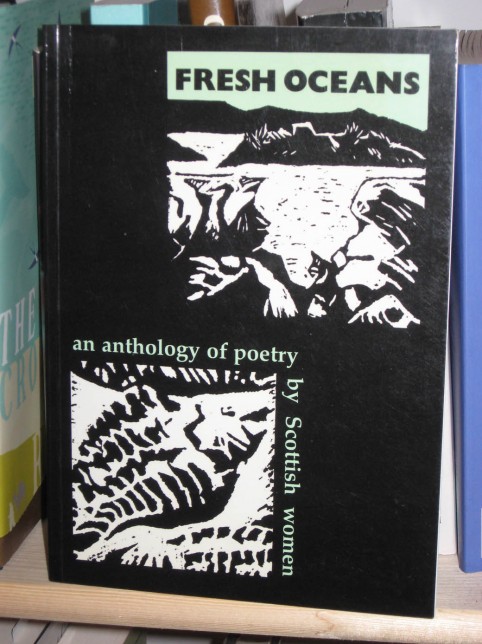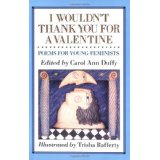I’ve just been browsing through a book I’ve had for a while, Noise and Smoky Breath, An Illustrated Anthology of Glasgow Poems 1900 – 1983, edited by Hamish Whyte and published in May 1983 by Third Eye Centre and Glasgow Libraries Publications Board.

Now the reason I have this book is because it’s a very attractive publication, not least because of the inclusion of artwork by the likes of Alasdair Gray, J.D. Fergusson and Joan Eardley, as well as photos from, amongst others, Oscar Marzaroli.
But a full 30 years on from its publication I’m left stunned when I revisit it, to see how few female poets are featured. Now, I’m going to assume that anyone using only their initials to represent their first name or names is male. And to be honest, in this case I think I’m pretty safe in that assumption. So, there are 81 poems altogether. Of these 9 are written by women. And of these 9, 4 are by the emerging poet, Liz Lochhead. In total, to represent 83 years, 4 female poets are represented; Jean Milton, Catherine Czerkawska, Margaret Hamilton and Liz Lochhead. In total 43 male poets have their ‘Glasgow’ poems published.
So just to be clear
72 poems by men, 9 by women
43 male poets, 4 female poets.
And this was only 30 years ago!
So where was the writing by women? Did it really not exist? Or is this strange imbalance in a society where women make up more than 50% of the population the result of lazy and ineffective editing?
In fact, a few years after the appearance of Noise and Smoky Breath, some enterprising women in Edinburgh, under the name Stramullion, decided to end the comparative invisibility of Scottish women poets. In 1980 they had published Hens in the Hay, poems by a women’s creative writing workshop in the capital. I think it was called the Pomegranate collective – perhaps someone out there could confirm that?
Anyway, in 1988 they put out a call to writing groups and individuals across Scotland saying they were looking for the best poetry by Scottish women for a forthcoming publication. That book was the ground-breaking Fresh Oceans, published in 1989, and proving that Scotland had indeed a healthy crop of women writing poetry.

Fresh Oceans, not only published women like myself for the first time, but also featured more established writers like Naomi Mitchison, Margaret Elphinstone, Rosalind Brackenbury. It was a huge boost to me personally, as the book obviously reached Carol Ann Duffy’s hands, and when she was editing the highly successful I wouldn’t thank you for a Valentine, poems for young feminists, she chose my ‘Fresh Oceans‘ poem, Anno Wreck Sick for inclusion. That anthology, first published in 1992, is still in print in the UK and the USA today.

And that’s the point. If women’s writing wasn’t made visible by anthologies such as Noise and Smoky Breath, how was it ever going to continue to exist, be published, enter the archives?
1992 was also the year that Harpies and Quines magazine was founded. It published poetry by women and was another much needed outlet to help redress the imbalance in most of the literary magazines of the time. In autumn 1993 literary magazine, Chapman, published a special double-edition (No. 74-75) featuring women in Scottish literature. In 1994 Gairfish, another Scottish literary magazine, brought out a special issue, Calemadonnas: Women and Scotland, and from the late eighties Polygon was bringing out its amazing Original Prints series, bringing to light writers like AL Kennedy and Janice Galloway.
So perhaps Glasgow women’s poetry hadn’t flowered early enough to get into Noise and Smoky Breath? It would be charitable to assume so, but ultimately, I suspect, it would be untrue. Years later, another anthology, Across the Water, Irishness in Scottish Writing, edited by three Glasgow men, including Hamish again, almost fell into the same trap when it was all ready to go to publication with only a tiny number of women included. On that occasion, after protests from the Scottish Arts Council with a threat to withhold financial subsidy unless the discrepancy was addressed, the editors took the time and made the effort, and lo! they found there were quite a few Scottish women writers with Irish family backgrounds that they’d failed to look for.
Many of the publications I’ve mentioned here – and lots of others I’ve not mentioned – are available in Glasgow Women’s Library. Not, of course, Noise and Smoky Breath.
Wriing this piece has made me think that maybe GWL should, thirty years on, collect poems by women about Glasgow?
If you have one, or have a favourite poem written by another woman, why not let me know? I’d love to put together a collection of poems to demonstrate that in 2013 women in Glasgow are writing eloquently about their lives here, and that we’re savvy enough to use Glasgow Women’s Library as a depository so our voices won’t be written out of history again. We might not be able to publish the poems as a book, but the poetry istelf would be there as an archive and a resource for anyone else putting together a Glasgow anthology.
I’d love to know what you think.
Magi

10 replies on “The Mystery of the Invisible Women Poets – Glasgow 1983”
Thank you for an interesting read about one of my favourite female writers! Perfect Saturday afternoon read.
Great blog, Magi, and unfortunately still relevant today, as the Vida count showed: http://www.vidaweb.org/the-count-2012.
But it was lovely to see Fresh Oceans again. I too had my first poem published there!
Alison
Was just reading your poem the other day. Beautiful. The Vida link is excellent – if depressing. Thanks for letting me and other know about it.
very interesting blog Magi. The comment from Alison Miller showing the VIDA count does prove your point.
I was actually quite shocked when I revisited Noise and Smoky Breath, hoping to find poems by women about Glasgow. So let’s all get writing those Glasgow poems, so it can never happen again, Jax!
I have to say I’m a little taken aback by those figures. I suppose I kind of assumed women had been well represented in poetry since at least the mid-20th century, but retrospectives like this show this is a misconception on my part and, I suspect, a lot of others. It’s just one of the reasons the work of the Women’s Library is so important.
Can I suggest getting in touch with the Mitchell? There have been tons of anthologies produced by local writers’ groups across Glasgow over the past 30 or 40 years, and many deposit copies with the Mitchell. It’s my experience that women are usually well represented in such creative writing clubs too.
Congratulations on an insightful and thought-provoking blog – and good luck with the idea of collating women’s poems about Glasgow.
Thanks for your suggestions, Drew. I’m sure that the Mitchell had similar archive material back in 1983 when Noise and Smoky Breath was being put together. Tom leonard did a grand job of finding poetry from men and women and putting it together in Radical Renfrew. No excuse for it really…
thanx for this interesting blog
it’s so disappointing that women have continued to be so under-represented
but it was good to be sent back to fresh oceans
and to read anno – wreck – sick which is also shocking
we need another harpies and quinies
but good news is that spare rib is about to return
in the meantime here’s to glasgow women’s library’s ongoing support and collection of women’s contemporary writing
kx
Quite agree with all you say, Kay. A new Harpies & Quines? That would be excellent!
Really interesting blog. I remember doing a few talks decades ago (can’t recall where or when) about the problems faced by women writers and I used the Harper Collins short stories collection as an example – hardly any women there – maybe three in each edition. Did you actually get together a collection of poems about Glasgow and put it in the Women’s Library? Or do you still want to?